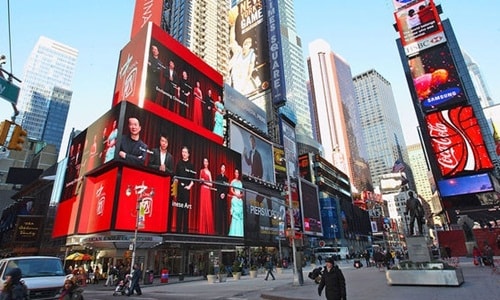Why is it difficult for China to succeed with its 'buying love with money' strategy?
China spends up to $10 billion a year to strengthen its soft power, but it is making its image worse and worse.
On electronic billboards in Times Square (New York, USA), images of rural China continuously appear. In Phnom Penh - the capital of Cambodia, children play under apartment buildings built by China. In some places in the world, children also learn Chinese in programs sponsored by the Chinese government.
For years, shoppers around the world have grown accustomed to seeing “Made in China” on most of the products they buy. But recently, China has been trying to promote its national brand to appeal to other countries the way the United States has done with its culture, products, and values.
A decade ago, China set out to build “soft power” to support its rapid economic growth. According to David Shambaugh, a professor at George Washington University, China spends about $10 billion a year on this goal. He considers it one of the most expensive national image-building programs in the world. Shambaugh said the United States spent less than $670 million on this in 2014.
 |
China is trying to win the hearts of countries around the world. Photo: Economist |
China was inspired by the concept of soft power from American scholar Joseph Nye. He coined the term in 1990. After years of debate, it was not until 2007 that then Chinese President Hu Jintao raised the issue, arguing that China needed to build soft power.
And his successor, Xi Jinping, has been very active in this process. He was the first Chinese president to attend the World Economic Forum in Davos, Switzerland, earlier this year, and won a lot of praise for his speech in support of globalization and his call for unity in the fight against climate change.
China has focused on bolstering its soft power through cultural promotion. Since 2004, it has spent a fortune on language classes, cooking, dancing and Lunar New Year celebrations in more than 140 countries around the world.
Xi wants to convince global investors that China is not a country to be feared, and that it can coexist with the US without conflict. China’s “One Belt, One Road” project – investing in infrastructure across Asia, the Middle East, Africa and Europe – is also intended to send a message that the country wants to use its new wealth to enrich the world.
Private Chinese companies are also actively participating in the process of promoting the country's image. In 2015, e-commerce giant Alibaba paid 260 million USD to buy Hong Kong newspaper - South China Morning Post. China's richest man - Wang Jianlin has bought many Hollywood film studios and cinema chains. A series of other Chinese companies also spent a lot of money on M&A with many famous companies in the world.
China’s efforts have had some effect. In some global surveys, Africans have become more positive about the world’s second-largest economy, thanks in part to the money China has poured into the continent.
In the United States, however, the picture is not as rosy. A year before Xi took office, more than half of Americans had a positive impression of the Chinese, according to Pew Research. By the end of last year, that number had fallen to 38%. Similar trends are occurring in many other countries.
China's economic growth has won it the admiration of many countries. However, its environmental and social consequences have also drawn criticism.
China is also increasingly losing its appeal in the eyes of foreign businesses, from the US, Europe to Japan and recently South Korea. High taxes, rising wages, fierce competition from domestic companies and inconsistent policies have made many businesses frustrated and forced to leave China in recent times.
Nye's theory is that soft power is not created by government. He explains that America's image is shaped by its people - "everything from universities and charities to Hollywood and pop music." Meanwhile, China's strategy is almost entirely government-led.
Economists say China is trying to combine hard and soft power to its advantage. But instead of improving the country's image, this strategy is backfiring.
According to VNE
| RELATED NEWS |
|---|
